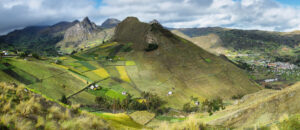 My dad used to tell me about growing up in the 1930’s when you could invite a passing stranger into your home for a meal and a night’s sleep without any concerns for your family’s safety. This same dad tried to dissuade me from going to Ecuador, warning me that there are plenty of people in the world who might be looking to hurt or kill an American woman of a certain age traveling alone.
My dad used to tell me about growing up in the 1930’s when you could invite a passing stranger into your home for a meal and a night’s sleep without any concerns for your family’s safety. This same dad tried to dissuade me from going to Ecuador, warning me that there are plenty of people in the world who might be looking to hurt or kill an American woman of a certain age traveling alone.
The fact is I’ve always been a bit of a loner. I could blame that on my nomadic early life as an army brat, always the new girl in school, never really sure of where I came from or where I belonged and forever the outsider. Or perhaps it’s the selfish streak that won’t allow me to waste precious time accommodating others or compromising my agenda. It could be that it was just the practical thing to do: I wanted to go to Ecuador, so I did it.
As a new retiree, I had done a lot of reading and learned that I would get a lot of geographical and cultural bang for my buck in Ecuador as there was an amazing amount of diversity in a limited area. Several distinct indigenous peoples, the influence of Spanish colonialism, the volcanic mountains, the jungle, the beaches, Quito’s urban sprawl, and perhaps the last “undiscovered” places on earth. And the wildlife. Holy Capybara, the wildlife!
Most compelling of all was the strange cultural duality of the place. It was at once rich and poor. Straightforward and complex. Rigid and freewheeling. From the very first day, I knew I had placed myself directly in the path of some unnamed yearning that had existed for me all my life.
I’m still not sure why I wanted to go to Ecuador but what I found there was a genuine welcome by a proud people eager to show me their country and their cultures. I found insight and enlightenment. Above all, I found personal freedom and the amazing sense of peace that comes from being “off the grid” if only for a couple of weeks.
Linda Caradine is a Portland Oregon based writer, traveler and animal lover.